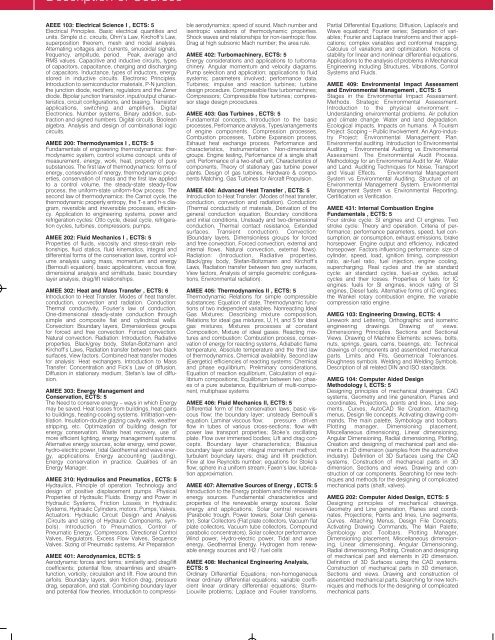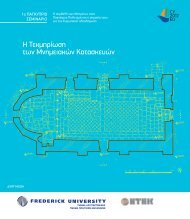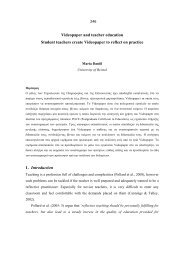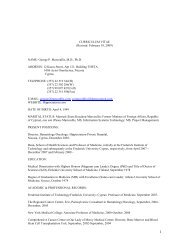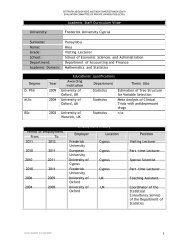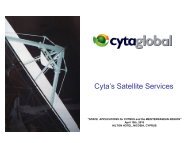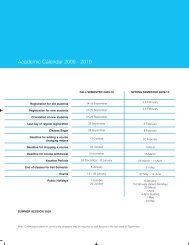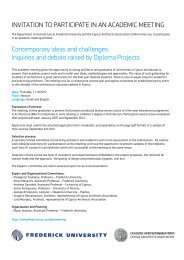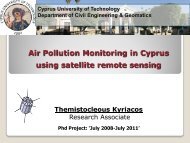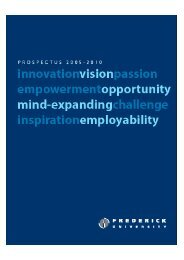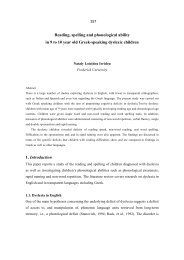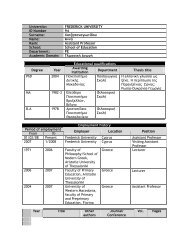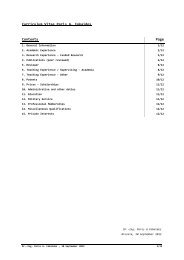Untitled - Frederick University
Untitled - Frederick University
Untitled - Frederick University
Create successful ePaper yourself
Turn your PDF publications into a flip-book with our unique Google optimized e-Paper software.
Description of Courses<br />
AEEE 103: Electrical Science I , ECTS: 5<br />
Electrical Principles. Basic electrical quantities and<br />
units. Simple d.c. circuits, Ohm’s Law, Kirchoff’s Law,<br />
superposition theorem, mesh and nodal analysis.<br />
Alternating voltages and currents, sinusoidal signals,<br />
frequency, amplitude, period. Peak, average and<br />
RMS values. Capacitive and inductive circuits, types<br />
of capacitors, capacitance, charging and discharging<br />
of capacitors. Inductance, types of inductors, energy<br />
stored in inductive circuits. Electronic Principles.<br />
Introduction to semiconductor materials, P-N junction,<br />
the junction diode, rectifiers, regulators and the Zener<br />
diode. Bipolar junction transistor, input/output characteristics,<br />
circuit configurations, and biasing. Transistor<br />
applications, switching and amplifiers. Digital<br />
Electronics. Number systems. Binary addition, subtraction<br />
and signed numbers. Digital circuits. Boolean<br />
algebra. Analysis and design of combinational logic<br />
circuits.<br />
AMEE 200: Thermodynamics I , ECTS: 5<br />
Fundamentals of engineering thermodynamics: thermodynamic<br />
system, control volume concept, units of<br />
measurement, energy, work, heat, property of pure<br />
substances. The first law of thermodynamics: forms of<br />
energy, conservation of energy, thermodynamic properties,<br />
conservation of mass and the first law applied<br />
to a control volume, the steady-state steady-flow<br />
process, the uniform-state uniform-flow process. The<br />
second law of thermodynamics: the Carnot cycle, the<br />
thermodynamic property entropy, the T-s and h-s diagram,<br />
reversible and irreversible processes, efficiency.<br />
Application to engineering systems, power and<br />
refrigeration cycles: Otto cycle, diesel cycle, refrigeration<br />
cycles, turbines, compressors, pumps.<br />
AMEE 202: Fluid Mechanics I , ECTS: 5<br />
Properties of fluids, viscosity and stress-strain relationships,<br />
fluid statics, fluid kinematics, integral and<br />
differential forms of the conservation laws, control volume<br />
analysis using mass, momentum and energy<br />
(Bernoulli equation), basic applications, viscous flow,<br />
dimensional analysis and similitude, basic boundary<br />
layer analysis, drag/lift relationships.<br />
AMEE 302: Heat and Mass Transfer , ECTS: 6<br />
Introduction to Heat Transfer. Modes of heat transfer,<br />
conduction, convection and radiation. Conduction:<br />
Thermal conductivity, Fourier’s law of conduction,<br />
One-dimensional steady-state conduction through<br />
simple and composite flat and cylindrical walls.<br />
Convection: Boundary layers, Dimensionless groups<br />
for forced and free convection. Forced convection.<br />
Natural convection. Radiation: Introduction, Radiative<br />
properties, Black/grey body, Stefan-Boltzmann and<br />
Kirchoff’s Laws, Radiation transfer between two black<br />
surfaces, View factors. Combined heat transfer modes<br />
for analysis: Heat exchangers. Introduction to Mass<br />
Transfer: Concentration and Fick’s Law of diffusion,<br />
Diffusion in stationary medium, Stefan’s law of diffusion.<br />
AMEE 303: Energy Management and<br />
Conservation, ECTS: 5<br />
The Need to conserve energy – ways in which Energy<br />
may be saved. Heat losses from buildings, heat gains<br />
to buildings, heating-cooling systems. Infiltration-ventilation.<br />
Insulation-double glazing cavity walls, weather<br />
stripping, etc. Optimization of building design for<br />
energy conservation. Waste heat recovery, use of<br />
more efficient lighting, energy management systems.<br />
Alternative energy sources, solar energy, wind power,<br />
hydro-electric power, tidal Geothermal and wave energy,<br />
applications. Energy accounting (auditing),<br />
Energy conservation in practice. Qualities of an<br />
Energy Manager.<br />
AMEE 310: Hydraulics and Pneumatics , ECTS: 5<br />
Hydraulics, Principle of operation. Technology and<br />
design of positive displacement pumps. Physical<br />
Properties of Hydraulic Fluids. Energy and Power in<br />
Hydraulic Systems, Friction Losses in Hydraulic<br />
Systems, Hydraulic Cylinders, motors, Pumps, Valves,<br />
Actuators. Hydraulic Circuit Design and Analysis<br />
(Circuits and sizing of Hydraulic Components, symbols).<br />
Introduction to Pneumatics, Control of<br />
Pneumatic Energy, Compressors. Directional Control<br />
Valves, Regulators, Excess Flow Valves, Sequence<br />
Valves. Sizing of Pneumatic systems, Air Preparation<br />
AMEE 401: Aerodynamics, ECTS: 5<br />
Aerodynamic forces and terms; similarity and drag/lift<br />
coefficients; potential flow, streamlines and streamfunction,<br />
vorticity, circulation and lift. Flow around thin<br />
airfoils. Boundary layers, skin friction drag, pressure<br />
drag, separation, and stall. Combining boundary layer<br />
and potential flow theories. Introduction to compressi-<br />
ble aerodynamics; speed of sound, Mach number and<br />
isentropic variations of thermodynamic properties.<br />
Shock waves and relationships for non-isentropic flow.<br />
Drag at high subsonic Mach number; the area rule.<br />
AMEE 402: Turbomachinery, ECTS: 5<br />
Energy considerations and applications to turbomachinery.<br />
Angular momentum and velocity diagrams.<br />
Pump selection and application; applications to fluid<br />
systems; parameters involved; performance data.<br />
Turbines; impulse and reaction turbines; turbine<br />
design procedure. Compressible flow turbomachines;<br />
Compressors; Compressible flow turbines; compressor<br />
stage design procedures.<br />
AMEE 403: Gas Turbines , ECTS: 5<br />
Fundamental concepts, Introduction to the basic<br />
processes, Performance analysis, Types/arrangements<br />
of engine components. Compression processes,<br />
Combustion processes, Turbine Expansion process,<br />
Exhaust heat exchange process. Performance and<br />
characteristics, Instrumentation. Non-dimensional<br />
groups. Engine testing, Performance of a single shaft<br />
unit, Performance of a two-shaft unit, Characteristics of<br />
components, Theory of stationary gas turbine power<br />
plants. Design of gas turbines, Hardware & components<br />
Matching. Gas Turbines for Aircraft Propulsion.<br />
AMEE 404: Advanced Heat Transfer , ECTS: 5<br />
Introduction to Heat Transfer: (Modes of heat transfer,<br />
conduction, convection and radiation). Conduction:<br />
(Thermal conductivity of materials, Derivation of the<br />
general conduction equation, Boundary conditions<br />
and initial conditions, Unsteady and two-dimensional<br />
conduction, Thermal contact resistance, Extended<br />
surfaces, Transient conduction). Convection:<br />
(Boundary layers, Dimensionless groups for forced<br />
and free convection, Forced convection, external and<br />
internal flows, Natural convection, external flows).<br />
Radiation: (Introduction, Radiative properties,<br />
Black/grey body, Stefan-Boltzmann and Kirchoff’s<br />
Laws, Radiation transfer between two grey surfaces,<br />
View factors, Analysis of simple geometric configurations,<br />
Environmental radiation).<br />
AMEE 405: Thermodynamics II , ECTS: 5<br />
Thermodynamic Relations for simple compressible<br />
substances: Equation of state, Thermodynamic functions<br />
of two independent variables. Nonreacting Ideal<br />
Gas Mixtures: Describing mixture composition,<br />
Relations for ideal gas mixtures, U, H, and S for ideal<br />
gas mixtures, Mixtures processes at constant<br />
Composition, Mixture of ideal gases. Reacting mixtures<br />
and combustion: Combustion process, conservation<br />
of energy for reacting systems, Adiabatic flame<br />
temperature, Absolute temperature and the third law<br />
of thermodynamics, Chemical availability. Second law<br />
(Exergetic) efficiencies of reacting systems: Chemical<br />
and phase equilibrium, Preliminary considerations,<br />
Equation of reaction equilibrium, Calculation of equilibrium<br />
compositions, Equilibrium between two phases<br />
of a pure substance, Equilibrium of multi-component,<br />
multiphase systems<br />
AMEE 406: Fluid Mechanics II, ECTS: 5<br />
Differential form of the conservation laws; basic viscous<br />
flow; the boundary layer; unsteady Bernoulli’s<br />
equation. Laminar viscous flow; pressure driven<br />
flow in tubes of various cross-sections; flow with<br />
power law transport properties; Stoke’s oscillating<br />
plate. Flow over immersed bodies; Lift and drag concepts.<br />
Boundary layer characteristics; Blausius<br />
boundary layer solution; integral momentum method;<br />
turbulent boundary layers; drag and lift prediction.<br />
Flow at low Reynolds number; equations for Stoke’s<br />
flow; sphere in a uniform stream; Faxen’s law; lubrication<br />
approximation.<br />
AMEE 407: Alternative Sources of Energy , ECTS: 5<br />
Introduction to the Energy problem and the renewable<br />
energy sources. Fundamental characteristics and<br />
properties of the renewable energy sources. Solar<br />
energy and applications, Solar central receivers<br />
(Parabolic trough, Power towers, Solar Dish generator),<br />
Solar Collectors (Flat plate collectors, Vacuum flat<br />
plate collectors, Vacuum tube collectors, Compound<br />
parabolic concentrators), Solar collector performance.<br />
Wind power, Hydro-electric power, Tidal and wave<br />
energy, Geothermal Energy. Hydrogen from renewable<br />
energy sources and H2 / fuel cells<br />
AMEE 408: Mechanical Engineering Analysis,<br />
ECTS: 5<br />
Ordinary Differential Equations; non-homogeneous<br />
linear ordinary differential equations; variable coefficient<br />
linear ordinary differential equations; Sturm-<br />
Liouville problems; Laplace and Fourier transforms.<br />
Partial Differential Equations; Diffusion, Laplace's and<br />
Wave equationd; Fourier series; Separation of variables;<br />
Fourier and Laplace transforms and their applications;<br />
complex variables and conformal mapping.<br />
Calculus of variations and optimization. Notions of<br />
stability for linear and nonlinear differential equations.<br />
Applications to the analysis of problems in Mechanical<br />
Engineering including Structures, Vibrations, Control<br />
Systems and Fluids.<br />
AMEE 409: Environmental Impact Assessment<br />
and Environmental Management , ECTS: 5<br />
Stages in the Environmental Impact Assessment.<br />
Methods. Strategic Environmental Assessment.<br />
Introduction to the physical environment –<br />
Understanding environmental problems. Air pollution<br />
and climate change. Water and land degradation.<br />
Ecological impacts. Impacts on humans. A Tourism<br />
Project: Scoping – Public Involvement. An Agro-industry<br />
Project: Environmental Management Plan.<br />
Environmental auditing. Introduction to Environmental<br />
Auditing - Environmental Auditing vs Environmental<br />
Assessment. The Environmental Audit Process.<br />
Methodology for an Environmental Audit for Air, Water<br />
and Land. Auditing Techniques for Noise, Transport<br />
and Visual Effects. Environmental Management<br />
System vs Environmental Auditing. Structure of an<br />
Environmental Management System. Environmental<br />
Management System vs Environmental Reporting.<br />
Certification vs Verification.<br />
AMEE 431: Internal Combustion Engine<br />
Fundamentals , ECTS: 5<br />
Four stroke cycle: SI engines and CI engines, Two<br />
stroke cycle: Theory and operation. Criteria of performance:<br />
performance parameters, speed, fuel consumption,<br />
air consumption, exhaust emissions, brake<br />
horsepower. Engine output and efficiency, indicated<br />
horsepower. Factors influencing performance: size of<br />
cylinder, speed, load, ignition timing, compression<br />
ratio, air-fuel ratio, fuel injection, engine cooling,<br />
supercharging. Real cycles and the air standard<br />
cycle: air standard cycles, fuel-air cycles, actual<br />
cycles and their losses. Properties of fuels for IC<br />
engines: fuels for SI engines, knock rating of SI<br />
engines, Diesel fuels. Alternative forms of IC engines:<br />
the Wankel rotary combustion engine, the variable<br />
compression ratio engine.<br />
AMEG 103: Engineering Drawing, ECTS: 4<br />
Linework and Lettering. Orthographic and isometric<br />
engineering drawings. Drawing of views.<br />
Dimensioning Principles. Sections and Sectional<br />
Views. Drawing of Machine Elements: screws, bolts,<br />
nuts, springs, gears, cams, bearings, etc. Technical<br />
drawings of components and assembled mechanical<br />
parts. Limits and Fits, Geometrical Tolerances.<br />
Roughness symbols. Welding and Welding Symbols.<br />
Description of all related DIN and ISO standards.<br />
AMEG 104: Computer Aided Design<br />
Methodology I, ECTS: 5<br />
Designing principles of mechanical drawings. CAD<br />
systems, Geometry and line generation, Planes and<br />
coordinates, Projections, points and lines, Line segments,<br />
Curves, AutoCAD file Creation, Attaching<br />
menus, Design file concepts. Activating drawing commands,<br />
The main palette, Symbology and toolbars.<br />
Plotting manager, Dimensioning placement,<br />
Miscellaneous dimensioning, Linear dimensioning,<br />
Angular Dimensioning, Radial dimensioning, Plotting,<br />
Creation and designing of mechanical part and elements<br />
in 2D dimension (samples from the automotive<br />
industry). Definition of 3D Surfaces using the CAD<br />
systems, Construction of mechanical parts in 3D<br />
dimension, Sections and views. Drawing and construction<br />
of car components. Searching for new techniques<br />
and methods for the designing of complicated<br />
mechanical parts (shaft, valves).<br />
AMEG 202: Computer Aided Design, ECTS: 5<br />
Designing principles of mechanical drawings,<br />
Geometry and Line generation, Planes and coordinates,<br />
Projections, Points and lines, Line segments,<br />
Curves. Attaching Menus, Design File Concepts,<br />
Activating Drawing Commands, The Main Palette,<br />
Symbology and Toolbars. Plotting Manager,<br />
Dimensioning placement, Miscellaneous dimensioning,<br />
Linear dimensioning, Angular Dimensioning,<br />
Radial dimensioning, Plotting, Creation and designing<br />
of mechanical part and elements in 2D dimension.<br />
Definition of 3D Surfaces using the CAD systems.<br />
Construction of mechanical parts in 3D dimension,<br />
Sections and views. Drawing and construction of<br />
assembled mechanical parts. Searching for new techniques<br />
and methods for the designing of complicated<br />
mechanical parts.


